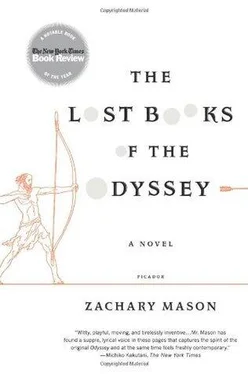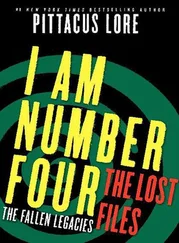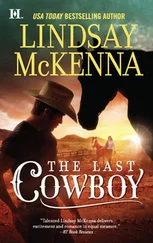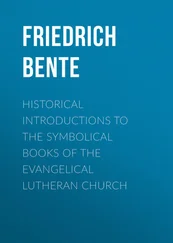
Time hissed by like the black arrows whose shadows darkened the plain before Troy. The clutch of the battle was so dense that the soldiers could barely move, constrained on all sides by friend and enemy alike, the bodies of their neighbors bearing them up and weighing them down. The wind lifted waves of white dust that coated faces, swords and armor. When the pressure let up the bleached soldiers dealt each other vicious, clumsy, short-armed blows; the crimson flows and spatters of blood were vivid on their whiteness. When the wind was low Odysseus could see the walls of Troy, never far away and always out of reach.

The smell of the island had not changed — oak, heat, dust, sea, stone — which heartened Odysseus as his white-sailed ship dropped anchor. As he walked up the road to his house for the first time in decades he promised himself that he would have nothing more to do with the affairs of gods or men, would go back to his woods and the stasis of unvarying afternoons. But it seemed that the tears of reunion had hardly dried before the house was filled with wailing and he stood before his father’s high funeral pyre with a torch in his hand. Soon thereafter he held his first grandchild, and under all the weight of birth and death a dam somewhere gave way and time flooded over him. Soon his grandson was tall and strong, as was the tree over his father’s grave, and well before he was ready he could neither string his great bronze bow, nor remember the names of the men who had died for him at Troy, nor speak.

Telemachus, Penelope and the maids carry Odysseus through the early morning fog to a small building in the hills behind the house. He has not been conscious for days and every breath is a violent, shuddering labor. His hands twitch, briefly, as though in unquiet dreams. The women fill the pitcher, make the bed and open the windows, leaving Telemachus to stand over his father.
Odysseus is aware of his son standing next to him, occasionally wiping his forehead, murmuring distractedly and looking out the window. Somewhere women talk in low, calm voices. It has been four days since he opened his eyes, but suddenly, emerging from confusion, he is looking at himself lying in bed. What he had thought were nurses are priests, Egyptians, moving around the room (its stone walls layered in hieroglyphics) making ready knives of black glass and alabaster jars. Next to him stands a jackal-headed man with his arms folded, waiting patiently. “Will they never be done and leave me in peace?” he wonders. And then (after the priests have set the jars by his feet next to a pile of linen bandages and jackal-head has whispered in his ear about immortality) he is lying on a table amid green, rolling hills (it occurs to him that this is like the view from his window, or what it will be in a thousand years when the city has eroded away). The hills envelop him, the valley deepening. The tracks of the wind in the tall grasses. Then it is night, the hills are gone. The table lies in a warm, shallow, unmoving sea. It is perfectly silent (except now and then a distant intimation of worried voices). There is no moon. The stars are dim, as though behind a layer of high clouds. But now they are approaching, and are brighter. Now brilliant. Fireworks.
*The Eighteenth Nile Dynasty of Egypt had an expansionary phase in pre-Classical times and planted colonies on many islands in the Mediterranean. These flourished briefly but ultimately withered due to a lack of support from Egypt, which was racked by a sequence of civil wars. By the time of the Trojan War only ruins and the occasional place name survived.
We look at a chess set and see a medieval king, some thin-blooded English Henry sitting in state next to his wanton termagant sorceress wife. Flanking them are machiavel abbés with thin upper lips, all masters of casuistry, elegant courtiers and confirmed atheists. To either side of the cathedral doors (in the checkered board we see first the elongated black-and-white cruciform of a cathedral’s floor plan and then the meticulously delimited plantations of a feudal estate) knights stand guard with hands resting on the pommels of zweihänders, plate mail gleaming. At the edges of the kingdom castellans stroll through winter and summer palaces, pulling white sheets from century-old furniture and airing tower bedrooms in preparation for a royal visit. Originally built as fortifications (with arrow slits and battlements to prove it), the palaces are now country châteaux, their portcullises overgrown with the vines of grapes and tiny, aromatic roses. Hardly worth a mention are the serfs who tend to their betters and their betters’ gardens — brave fellows, always ready to drop teapots and shears to take up long pikes for a headlong charge at the enemy.
If our discernment were keener, we would see an altogether more ancient and chaotic battlefield. Four-handed chatarang, the progenitor of modern chess, was created in India for the soldier castes two millennia before Christ with pieces that are, in some cases, hardly recognizable. The queen, now the terror of the board, was then a politic vizier who hovered by the king’s side as though fearful of offending. The bishops were war elephants, tusked monsters trampling infantry while the mahouts on their backs shot sling stones and spears. The knights were a cavalry of mounted archers (in the centuries before the stirrup was invented there were no lances), striking swiftly and galloping away. The rooks were not fortresses but war chariots, terrible weapons racing over the battlefield pell-mell, rattling over stones and corpses, wheel-mounted scythes slashing through the legs of men and horses.
The Katishya caste, who were the warriors and rulers of Indian society at the time, believed deeply in the innate elegance of rectilinear order. Their image of paradise was a perfectly level green field bisected north to south by one cold, blue river and east to west by another. Their gardens matched this ideal as closely as possible and, perversely, so did their maps. It was considered self-evident that the earth, an emanation of the mind of god, was arranged in arrays of adjacent, geometrically perfect squares — the failure of the observed geographical world to match this mathematical ideal was easily accounted for by the sinfulness of man and the decadence of the times. The Katishyas’ military science resembled their gardening and their cartography — a small repertoire of battlefield maneuvers was drilled into troops and petty officers until they could be executed with repeatable precision, and the mastery of this lexicon and its combinatorics was considered the essence of generalship. The Katishyas considered it the epitome of strategy to take the dust-shrouded confusion of the battlefield and reduce it to a set of symbols on a grid from which could be derived a concise sequence of moves leading inevitably to victory.
Chatarang radiated out from the subcontinent and begat many descendants — it is said that there are as many variations of chess as there are Indo-European languages. Not least among its issue was a game immensely popular in the Achaean societies of the Attic peninsula and the culturally similar islands of the Cyclades in the thirteenth century before Christ. The sum total of the source material for the Achaean variant consists of two complete and three partial game sets (all but one of which were excavated on Chios, known for producing the greatest chess masters), a reference in Hesiod and a primer that was a sort of rarefied transcript of a particularly long and difficult game.
Читать дальше













